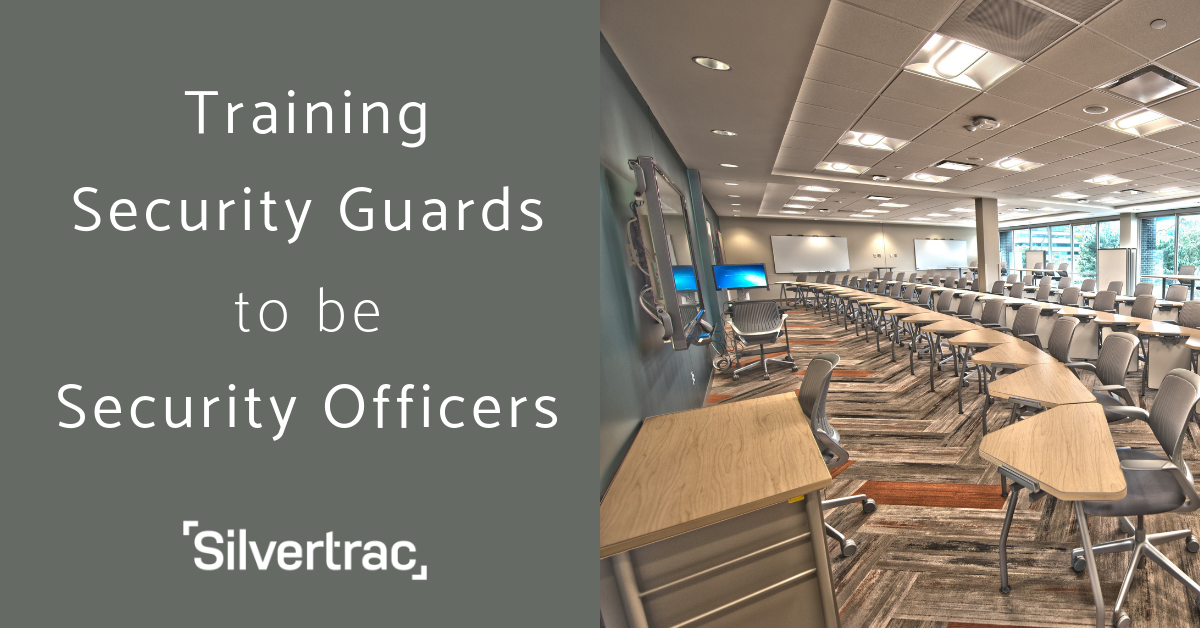The Silvertrac Extra
Training Your Security Guards to be Security Officers

The difference between the titles security guard and security officer can seem trivial, but it can hold a lot of difference for your employees and clients. There are distinct differences between security officers and security guards that should be noted before planning to hire one or the other. Your physical security company should ensure a proper understanding of these differences when advertising services to clients and recruiting new employees or contract associates.
Often, the term “officer” is used to put an individual in a more professional light, holding advanced security officer training and certifications. This can often be an aspirational title for many, and if an organization is going to use this title, both management and the officers need to maintain consistency. For example, if you aren’t planning to implement a hierarchy between guards and officers, management should refrain from ever using the term “guard” as it doesn’t exactly showcase the level of training and professionalism officers aspire to.
It may seem like there are many steps to differentiate that of a security guard and security officer, but it’s all about motivation. It is mostly up to the guards themselves to act like an officer, and therefore fall into the officer role themselves. Let’s look at how that transformation can be achieved with effective training for security officers.
Security Guard Education Requirements
Good officers don’t need to have a bachelor’s degree, or any college experience for that matter. Even if the individual is only a high school graduate, he or she can be an excellent security officer. There are also numerous training and certification options that can aid in career advancement opportunities as a security officer. Additionally, retaining a Security Guard License could help make candidates a better hire for physical security organizations. By continuing education and staying up to date on the latest trainings, there are expanded career opportunities available.
What Makes a Security Officer Training Program Successful?
There are a handful of distinct types of training for security officers. Many security companies offer certificate-based training that can be completed in less than a week and often online. Security officer training can also be done in person through your own company. Often the best way to do so is to have a newcomer shadow a security officer who has already completed training and obtained a certificate. This allows for valuable on-the-job training that is custom-tailored for your business and location.
- Quality Instructors
The first step to creating the best security guard training program possible is finding a great instructor and materials list. Without those tools, you can’t successfully train anyone on anything. While it is important that the information being taught is relevant to the current security industry, a high-quality instructor remains key. An engaging instructor knows how to best approach the material and parse that down to their students.
- Effective Materials
That said, a combination of videos, interactive training, pamphlets, and quizzes can be the best way to keep the potential security officers involved in their training. Involvement is key in the retention of the material your instructor is teaching. Poor retention leads to poor action in your security officers, which may end up costing your company.
Security Officer Training Methods
A guide on how to train security guards to become security officers is incomplete without going over tried and tested methodologies. The training method you utilize has a great deal to do with how well training is received and retained by your officers. Here are some different methods that you could find valuable:
- KISS – Keep It Simple Stupid. This should be a commandment of everyone who trains people. Keep your training simple! You are training your participants in something they may not know much about. It's best to keep it at a basic level and build upon that as you go along. Build on your subject and let trainees absorb what you’re teaching them - slowly. It doesn’t matter if you’re training security officers, supervisors, or C-suite executives. Keep it simple.
- The Socratic Method – It is a simple yet remarkably effective way of teaching people. In essence they train themselves. Instead of giving them the answers, ask them open-ended questions and allow them to answer. If they don’t know the answers they sit and stew for a few seconds. But in the process, they are throwing out answers that are both right and wrong. You can tell them if they are on the right track or not. This allows the students to engage in the learning process and participate in the discovery of new material.
- Shock Method– Starting classes off with a hook that can’t be ignored. They need to understand why they are in the course and what’s in it for them. Start with a story or example that gets everyone’s attention. It makes them sit up, take notice, and wonder what’s going to happen next. And while it may be a bit theatrical and dramatic it is effective.
Early Security Service Training and Continued Learning
The key is to let your officers know what’s going on within the company and industry. Every security company should be doing a basic orientation class and providing an employee handbook, but that alone is not enough. Things will be different when they get on the site. Still, this early training for security guards and officers is important, as that’s how you establish the habits and expectations of a professional officer.
Encourage them to read about a variety of topics. If they’re in a plastics plant, provide them with magazines about the plastics and manufacturing industries. If you’re contracted, your officers must know your client’s business and how it works, even if they are just a rover.
On-The-Job Training for Security Officers
Just because your guards have completed the required hours of training, seminars, or videos, that doesn’t mean their security officer training is completely done. The difference between classroom training and on-the-job training (OJT) is enormous. While the orientation training is generalized, OJT shows officers the ins and outs of their specific post.
If your officers pay close enough attention to OJT and allow themselves to become ‘lost’ in their new facility, then they’ll become intimately aware of most anything that occurs in it, both day and night. Part of your officer’s education should be learning to understand every single inch of the facility. By learning these things, wandering around, and even getting lost in the facility at first, they will become familiar with every part of it. By doing so, they’ll be able to detect anything wrong and correctly report its location, sound, condition, and so on.
Testing and Evaluation
Education and training are just one step in this process of helping your guards become officers. You also need to evaluate their capabilities, observe them in the field, and encourage them to go above and beyond for your customers.
While training is the first step, testing needs to come immediately after. If you don’t test your officers, you can’t know whether they learned and retained what you tried to teach them. Just as importantly, they won’t know if they need to do more work to improve. Testing your officers establishes clear expectations and makes it easier to correct issues in the future.
Whether your training is in the classroom, on the job (OJT), or just a yearly refresher course, you should have written tests after every session. Essay questions force the officer to think out their answer and express it in their own words, proving their understanding of the concepts.
Informal oral tests can also be useful. Whether you see your officers in the office or on a random post inspection, ask them a question about their assignment and require them to answer in as much detail as possible. This demonstrates their understanding and polishes their communication skills, another key quality that a professional officer needs to have.
Both tests will keep them alert and help them learn about their assignment. Additionally, preparing for these tests will keep them up to date on their post, client needs, and developments within the company and the industry.
Field Supervision
Either you or trusted managers should be conducting regular post inspections. This needs to be more than just making sure they’re at their post and chatting casually. Ask them questions about the post, post orders, and anything they think could be improved. Be receptive to their feedback and make them feel respected and valued.
On top of reviewing the major points of concern, you’ll want to ensure all the little things are meeting your company’s standards. Checking on their uniforms, duties performed, and passing along memos will reinforce the expectations of the officer and let them know the company really does take an interest in them.
Expressing interest in your security officers is also a fantastic way to learn their strengths and weaknesses. This can show you what needs to be trained for with newer employees as well as what yearly training updates may look like. Setting up a rapport with your security officers is never a waste of time.
Go Above and Beyond
Encourage your officers to go beyond what most people would expect, or possibly even consider reasonable. What that means is that they should take nothing for granted. If they hear a noise in a dark facility, no matter what kind, then inspect it. It might just be a rat or mouse, but it could also be a criminal breaking into the facility to cause who knows what kind of havoc.
Let your officers know they’re expected to show the same level of professionalism in their interactions with customers as well. There is so much more to customer service than smiling and being respectful. It includes items such as being friendly, knowing the facility, and being aware of their employees as well as their customers.
How to Train Security Guards to Become Security Officers
There’s no magic elixir to turn average guards into officers. It takes a lot of arduous work for your officers to gain the knowledge and effective habits they need to live up to the name. That means you need to encourage them to be constantly learning and improving. In turn, they will have the courage to lead by example for themselves and further security officers you hire later.
Having proper security guard training, and a good mentality for your officers is the best way to ensure that you have employed security officers and not security guards. In turn, they will lead their peers and your other employees by example, furthering the safety and smooth running of your business.





